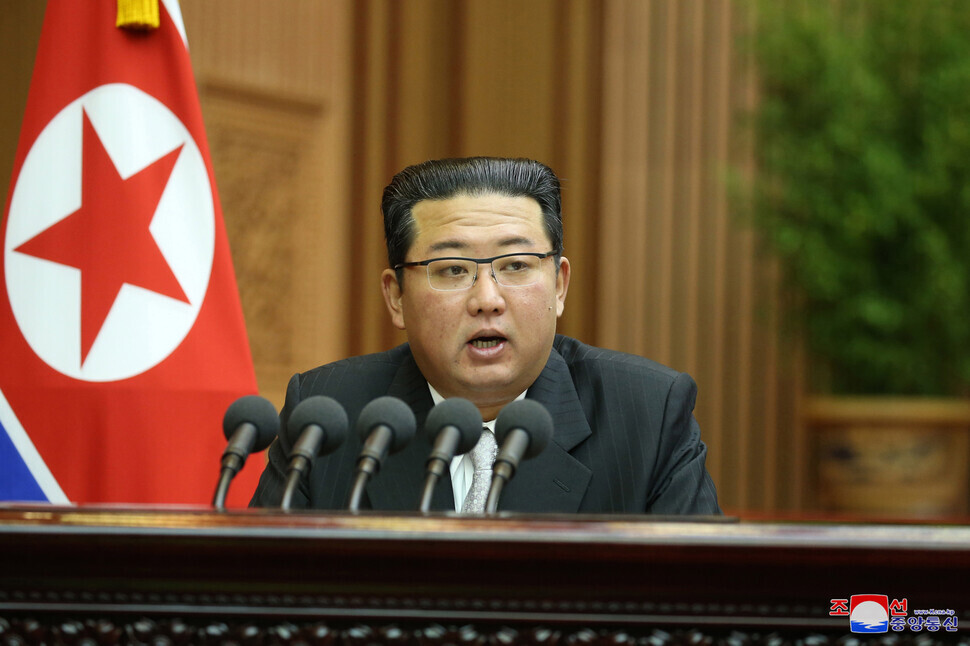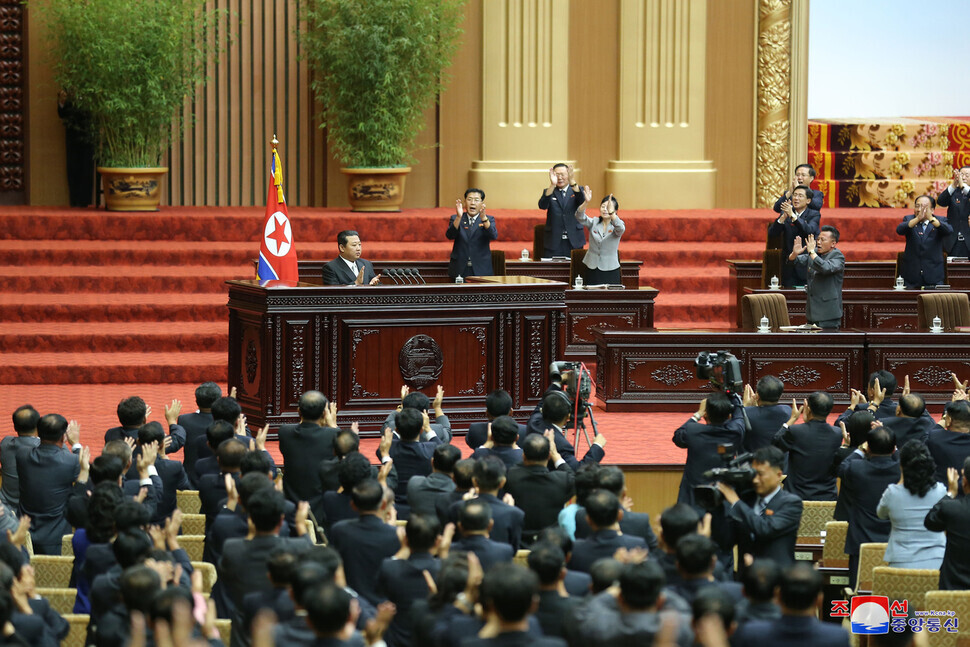hankyoreh
Links to other country sites 다른 나라 사이트 링크
[News analysis] Kim Jong-un announces restoration of inter-Korean hotline, asks S. Korea for action over empty words

North Korean leader Kim Jong-un, who serves as general secretary of the ruling Workers’ Party of Korea and president of the State Affairs Commission, announced in an official public speech that he will restore inter-Korean hotlines.
This follows South Korean President Moon Jae-in’s proposal at the United Nations General Assembly to formally declare an end to the Korean War and the call for another inter-Korean summit by Kim Yo-jong, the sister of the North’s leader and vice director of the WPK’s Central Committee. This latest development is a sign that the strained ties between the Koreas are thawing again.
The front page of the North’s state-run daily newspaper the Rodong Sinmun on Thursday quoted Kim Jong-un as saying he will “see to it that the North-South communication lines cut off due to deteriorated inter-Korean relations are restored first from early October.”
The daily added that he “made a historic policy speech ‘On the Orientation of Present Struggle for a Fresh Development of Socialist Construction’ at the second-day sitting of the fifth session of the 14th Supreme People's Assembly.”
On July 27, inter-Korean military hotlines were restored 413 days after they were severed. The same day, South Korean President Moon Jae-in and North Korean leader Kim Jong-un exchanged letters to mark the anniversary of the 1953 Armistice Agreement that ended the hostilities of the Korean War. Yet after Kim Yo-jong’s condemnation of a joint South Korea-US military exercise on Aug. 10, the hotlines went dead again when Pyongyang did not respond to calls from South Korea.
Because South Korea attempts calls each morning and evening, all it would take to restore the hotlines is for the North to pick up the phone.
On reconnecting inter-Korean hotlines, Kim Jong-un said this was “part of the efforts for realizing the expectations and desire of the entire Korean nation to see the earlier recovery of North-South relations from the present deadlock and durable peace settling on the Korean Peninsula,” adding that inter-Korean ties were at a critical crossroad.
He added that the attitude of South Korean authorities will determine whether inter-Korean relations “would be restored and develop onto a new stage or continue to keep the present state of worsening.”
The North Korean leader said the ball is in the South’s court. As the “fundamental principles of resolving cross-border ties,” he said, “It is important for South Korean authorities to change their confrontational and habitual attitude toward our Republic, keep the stand of national independence through practices, not with words, deal with inter-Korean relations with a view to settling essential matters, and give weight to and sincerely implement North-South declarations.“
Though he made similar comments in January this year, he changed the wording this time from “cease all hostilities” to “through practices, not with words.” This is interpreted as a request for Seoul to concretely implement inter-Korean agreements and put them into practice.

Kim Jong-un did not directly mention another inter-Korean summit.
He did, however, reconfirm Kim Yo-jong’s comments on the proposed summit. On Sept. 24 and 25, Kim Yo-jong said there was no need to waste time arguing and proposed a “leaders’ reunion” to hold “constructive talks on recovering relations and development prospects.” Though she qualified her statement by saying that these were her personal opinions, her comments are thought to have received the green light from her brother before she made them.
Kim Jong-un also discussed his country’s stance on the US.
The US is pushing "diplomatic engagement" and "dialogue without preconditions," he said, “but it is no more than a petty trick for deceiving the international community and hiding its hostile acts and an extension of the hostile policy pursued by successive US administrations.” In a comment similar to what he said in January, he urged Washington to stop its policy of treating Pyongyang as an enemy as the “key to the formation of new [North Korea-US] ties,” but said the North would confront the US “under the principle of power vs. power, one on one.”
While Kim Jong-un did not directly mention the direction of policy toward the US, he said his government will “prepare a tactical policy in international business to devise a strategic plan for the US” The term “policy toward the US” (diplomatic, not military) is interpreted as not being closed given the reference to international trade, thus the connotation seems to be a “diplomatic solution.”
His statements are considered forward-looking compared to what he said in January. Simply put, the gist is “South Korea now, the US later” — a stark contrast to the North’s earlier priority on dialogue with the US.
This can be interpreted as the North exploring whether inter-Korean cooperation can lead to friendlier US policy toward North Korea. Above all, the focus seems to be on domestic affairs such as economic recovery, which is suffering due to crippling sanctions and prolonged border closure due to COVID-19. The intent to create an absolute minimum of a “stable external environment” is apparently in the background.
On responding to the pandemic, Kim said that stabilizing and improving the lives of North Koreans are the “most important and proactive revolutionary task of the present era.”
Over in South Korea, the government expressed guarded expectations over the North Korean leader’s speech. The National Security Council said in a meeting, “We are evaluating North Korea’s actions,” adding, “Amid no rise in military tension, maintaining stability on the Korean Peninsula is more important than ever.”
The Ministry of Unification said, “We hope for the reconnection and stable operation of inter-Korean hotlines.
With the intentions of the leaders of both Koreas confirmed, the reconnection of cross-border hotlines early this month could help boost relations, such as through cooperation in fighting COVID-19. Yet the speed of acceleration will vary depending on how the North marks the 76th anniversary of the founding of the Workers’ Party of Korea on Oct. 10 and what message it sends to the US.
By Lee Je-hun, senior staff writer
Please direct questions or comments to [english@hani.co.kr]

Editorial・opinion
![[Column] When ‘fairness’ means hate and violence [Column] When ‘fairness’ means hate and violence](https://flexible.img.hani.co.kr/flexible/normal/500/300/imgdb/original/2024/0516/7417158465908824.jpg) [Column] When ‘fairness’ means hate and violence
[Column] When ‘fairness’ means hate and violence![[Editorial] Yoon must stop abusing authority to shield himself from investigation [Editorial] Yoon must stop abusing authority to shield himself from investigation](https://flexible.img.hani.co.kr/flexible/normal/500/300/imgdb/original/2024/0516/4417158464854198.jpg) [Editorial] Yoon must stop abusing authority to shield himself from investigation
[Editorial] Yoon must stop abusing authority to shield himself from investigation- [Column] US troop withdrawal from Korea could be the Acheson Line all over
- [Column] How to win back readers who’ve turned to YouTube for news
- [Column] Welcome to the president’s pity party
- [Editorial] Korea must respond firmly to Japan’s attempt to usurp Line
- [Editorial] Transfers of prosecutors investigating Korea’s first lady send chilling message
- [Column] Will Seoul’s ties with Moscow really recover on their own?
- [Column] Samsung’s ‘lost decade’ and Lee Jae-yong’s mismatched chopsticks
- [Correspondent’s column] The real reason the US is worried about Chinese ‘overcapacity’
Most viewed articles
- 1Could Korea’s Naver lose control of Line to Japan?
- 2[Column] Welcome to the president’s pity party
- 3[Column] US troop withdrawal from Korea could be the Acheson Line all over
- 4Naver’s union calls for action from government over possible Japanese buyout of Line
- 5[Editorial] Korea must respond firmly to Japan’s attempt to usurp Line
- 6Korea cedes No. 1 spot in overall shipbuilding competitiveness to China
- 7[Editorial] Yoon must stop abusing authority to shield himself from investigation
- 8[Column] When ‘fairness’ means hate and violence
- 9Korean opposition decries Line affair as price of Yoon’s ‘degrading’ diplomacy toward Japan
- 10Second suspect nabbed for gruesome murder of Korean in Thailand, 1 remains at large